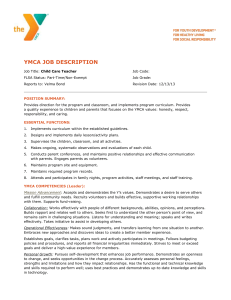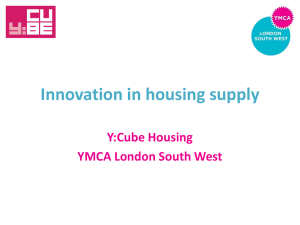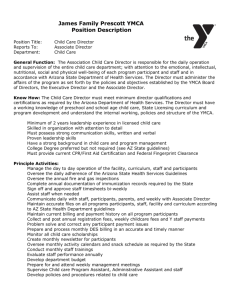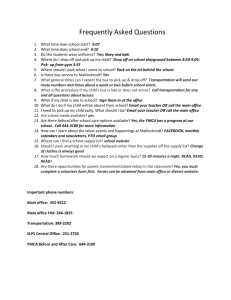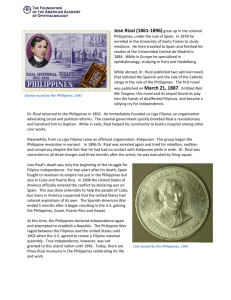YMCA - Rizal Youth Leadership Training Institute through the Years
advertisement
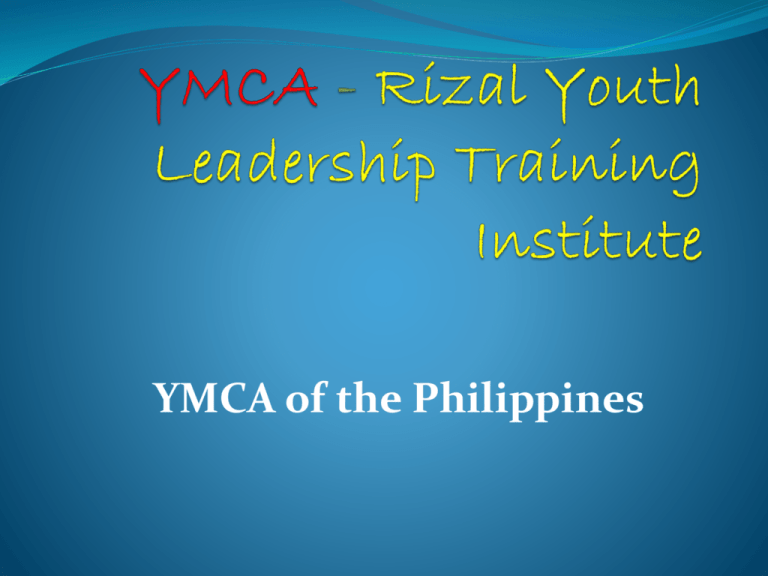
YMCA of the Philippines Laying the Foundation Way back in the decade of the 60’s, leaders of the YMCA of the Philippines conceived and established the Rizal Youth Leadership Training Foundation To restore honesty and integrity in public service To carry out the objectives of training future leaders along the virtues of honesty, justice, excellence and love of country A training program was therefore conceived: the yearly YMCA-Rizal Youth Leadership Training Institute, a month long intensive study of Rizal and other heroes, in addition to leadership skills development. Birth of the Institute • The institute was formed in 1961 marking the centennial celebration of the nation’s foremost hero, Dr. Jose P. Rizal, and the Golden Jubilee of the YMCA of the Philippines Pilot Institute The pilot institute was held in 1962 in Manila by a select group of 15 University students trained under a curriculum anchored on honesty, justice, excellence and love of country. First Regular Institute In 1963, the first regular Institute was held in Dapitan where Rizal lived while in exile. It was attended by 89 outstanding students coming from all over the country. Scholars from this Institute now occupy top positions in the public and private sectors Moving On From historic Dapitan, the mobile Institute moved from one historic place to another, drawing together top student leaders from the country’s colleges and universities. In the process, the Institute has also steadily grown with a pool of RYLTI alumni – an expanding manpower base that has proven essential to the enthusiastic participation in succeeding institutes Through the years, too, the Institute curriculum has undergone some fine tuning and enrichment in response to the dynamic requirements of Philippine society and to the challenges that confront leaders in contemporary times, but it still adhered to some constants – its unchanging emphasis on honesty, integrity and love of country. Institute Closed With the governance and financial crisis that the YMCA of the Philippines had undergone during the mid 90’s, the institute was closed after its 29th batch in 1995. Simultaneously, the Foundation which provide financial support to the said program was dissolved. Revival of the Institute With the change of the management and leadership of the YMCA of the Philippines in 2007, the Institute was revived as a part of the YMCA Strengthening processes. The institute has become a venue for training young people to become transformational leaders not only for the country but for the whole global community. The first revived institute gathered 12 Uni-Y leaders and youth volunteers for the intensive 15-day training. The trainees eventually became leaders and staff in their respective local Associations. Training Objectives The institute is designed to produce a pool of youth leaders equipped with values, skills and knowledge to effectively respond to the many challenges and issues of the world today. Specifically, it is envisioned to develop youth leaders who, in their specific spheres of influence, will have the skills and abilities to: Model attitudes that affirm persons, as well as, Generate these in others, Turn conflicts into creative problem-solving situations, Balance personal and organizational objectives Evolve a systematic approach in managing task groups, Use a set of effective leadership behaviors in dealing with human, natural and material resources, Initiate and manage purposive change efforts. Program Components Perspective Setting Identity and Value Clarification Contemporary Philippine Situation Leadership Study Series The YMCA Program Development Community Exposure Development of Proposed Action Key Contributions Conducted 35 leadership training institutes at various key and historic places in the country, and creating a positive impact on each community where the Institute is held. Graduated 1,401 top student leaders, many of whom , are now holding leadership position in government, educational institutions, welfare organizations, and business enterprises. Contributed significantly to the awareness of colleges and universities nationwide the need to inculcate leadership development values and skills, as the result of the yearly search and screening of Institute scholar Develop a body of material relating to youth leadership development in such forms as workbooks, and other output papers, lectures, speeches, curricula on various leadership development concerns, films and slides, community profiles – that now form part of the Institute documents. Developed a unique leadership development approach that has been fine-tuned through the years, that combines value clarification, issues awareness, community exposures, global citizenship education and leadership skills, distinct and apart from other leadership development efforts. Spearheaded various action responses on issues prevailing in the participants respective local communities. Has resulted to partnership with NGOs and GOs in the implementation of the action plan designed by the participants. We cannot always build The future for our youth, But we can build Our youth for today And for the future.
